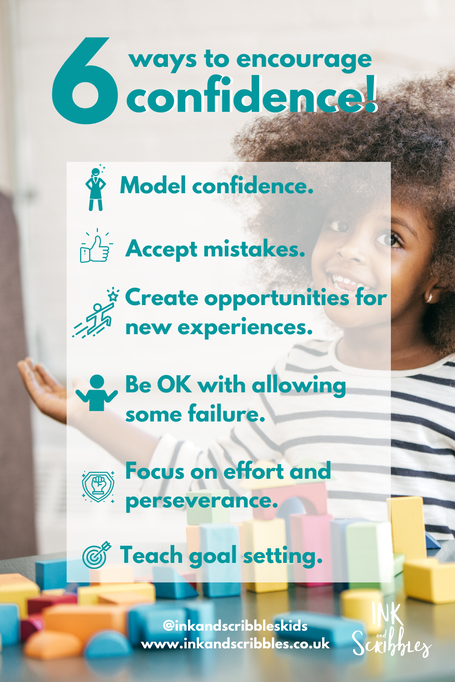We can help our children discover their inner superpowers and see themselves in a positive light. There's a few things that every superhero has: resilience, acceptance of self, a passion or purpose and growth mindset. Here's 6 easy to implement ways you can support your child to find their power within:
Enjoy the confidence you see your child find, when you guide them to discover to their inner powers. Ruth BusseyInk and Scribbles Founder
0 Comments
1. Model Confidence Our children look to us as an example of how to think and act. As parents we have real influence over the minds of our little people, who often absorb our beliefs and values in childhood and take them through into their adult life. Showing belief in your child also helps them have self confidence. Children read between the lines and even though we might not say we're feeling nervous for them, they can interpret our non verbal communication as a vote of no confidence. For some children, this can have a real impact on their emotional development so even if you're worried about them having a go at something new, don't show it! Or a the very least be very clear that your own emotions are not about them. Because often they aren't! We might be worried about our child starting a new extra curricular activity, for example. But our emotional response is a reaction to our own trigger, such as fear of rejection or the intensity that we feel empathy etc, rather than our belief in our child's ability. 2. Accept Mistakes Try and react gently to mistakes. I really resonate with this one. As a child, I took adult reactions to my mistakes very personally and they formed my perception of myself for a long time. Getting things wrong became a real fear of mine, leading to perfectionism in many areas of my life and being a people pleaser. Encouraging our children to learn from mistakes reduces the fear to try new things, keeps their inner critic in check and helps self talk stay positive and encouraging. 3. Create and explore new experiences Helping your child to push their comfort zone teaches them that they can do hard things and still be OK! Our instinct as parents is to protect our children, but this can become detrimental if we constantly keep them in their comfort zone. If your child shows an interest in challenging themselves, you can help them make achieve small goals to prepare for it, rather than hold them back from it entirely because the main goal seems too big. This will also demonstrate to your child that you believe in them, nurturing their self esteem. Holding our children back from new experiences tells them to fear hard things, but what we actually want them to know is that as long as they are safe, they can do hard things and come out the other side. 4. Be OK with allowing some failure We've already touched upon overprotection being potentially disempowering, and this one adds to this message. Again, our protective instinct can kick in and we can have a powerful urge to fix things for our kids. This is especially true when we see them hurting. But there is another path that is empowering, as well as supportive. When we see our children fail, we can give them the scaffolding they need to learn how to bounce back from those experiences. This builds resilience, a key trait for overall wellbeing and mental health. We can teach our kids that failing doesn't make them a failure. How much more confident would you have felt if you'd been given this message as a child?! 5. Focus on effort and perseverance This supports our children in developing a growth mindset. Again, this builds resilience. But having a growth mindset will also mean our kids are accepting of themselves and don't value who they are based on things such as grades. Instead, they value effort and know that they can always improve and learn more. In fact, knowing this means they have increased confidence because they understand the control they have over their ability to achieve. 6. Teach them how to goal set.
Goal setting shows our children that they can make small steps towards a bigger goal. Often, we lack confidence because the big goal feels out of reach. It's overwhelming to stand at point A and expect to reach point D without passing point B and C! This means our inner critic turns up with sentences that begin with 'I can't, which is clearly a confidence knock. Planning the steps and achieving the smaller goals increases confidence and gives the knowledge that improvement will happen. |
Categories
All
Archives
April 2024
AuthorHey! I'm the founder, creator and voice of Ink and Scribbles. Sharing thoughts on child well-being and parenting that are based on my teaching and parenting experience, and NLP learning. |



 RSS Feed
RSS Feed